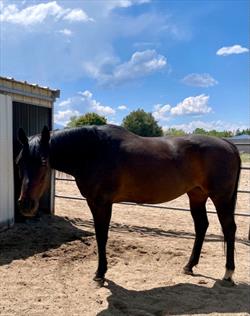Bob Judd, DVM, DABVP (Equine Medicine), DABVP (Canine and Feline Practice)
bay mare in paddock

Image Courtesy Pegi Webster
Equine protozoal myeloencephalitis, or EPM, is a common neurological disease in horses. New research may have found a cost-effective method of preventing the disease.
What Causes EPM?
EPM is caused by the protozoal organism Sarcocystis neurona. Young horses or those that are stressed by hauling or high-intensity exercise are more susceptible to the disease than other horses due to decreased immunity. Research on preventing this disease is difficult because not all horses exposed to the disease get sick.
EPM Research
Researchers have purposely fed horses this protozoal organism to try to cause disease, and it generally does not work. To evaluate the efficacy of preventing a disease, the prevention is administered to the animal, and then the animal is exposed to the disease. The animal is then observed or tested to see if they become ill.
With EPM, the horse does not always become ill, so it is difficult to determine if a preventative therapy is effective. One method is to find the medication levels in the blood and compare that to the known amount of drug needed to inhibit the infective organism.
A Potential New Treatment
A study was performed recently with a product containing diclazuril. The Food and Drug Administration approves diclazuril for the treatment of EPM. The study found that giving healthy horses diclazuril only once a week at the labeled dosage was 130 times higher than the level needed to inhibit the organism. Because of this finding, giving diclazuril once a week could prevent EPM infection.
However, a more extensive study will be needed to determine if this once-weekly dosage prevents the disease.
If you have concerns or questions, consult your veterinarian about other treatments for the neurological disease EPM.